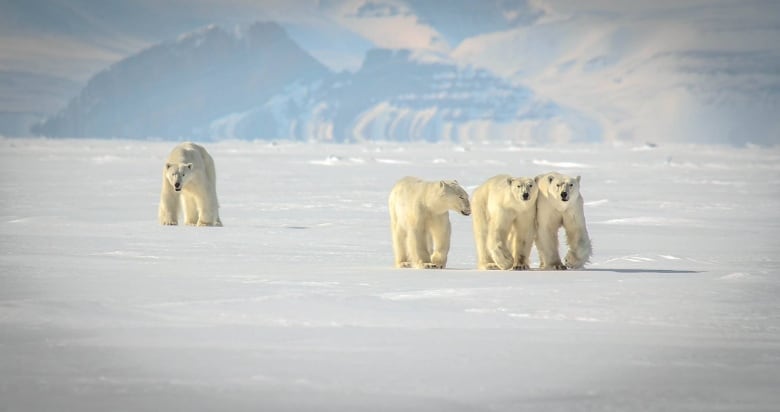Inuit Knowledge and Climate Change
 |
| The draft management plan leans heavily on Inuit knowledge, which contradicts polar bear population estimates from Environment Canada. (Niore Iqalukjuak) |
"Inuit believe there are now so many bears that public safety has become a major concern."
"Public safety concerns, combined with the effects of polar bears on other species, suggest that in many Nunavut communities, the polar bear may have exceeded the co-existence threshold."
"Although there is growing scientific evidence linking the impacts of climate change to reduced body conditions of bears and projections of population declines, no declines have currently been attributed to climate change."
"[Inuit knowledge] acknowledges that polar bears are exposed to the effects of climate change, but suggests that they are adaptable."
Nunavut government draft management plan
"That's just plain wrong. That's been documented in many places now -- not just linked to body condition but reproductive rates and survival."
"They will move into communities seeking food [with a lack of sea ice due to climate change]. There's lots of attractants around Northern communities."
"They [Nunavut] don't ask for input from southern scientists. The less input from the South is where it seems to be moving."
"If the stated goal is to have fewer polar bears, that may be the tripping point whereby polar bear management in Canada comes under renewed scrutiny."
Andrew Derocher, polar bear expert, University of Alberta
"[Inuit knowledge] has not always been sufficiently incorporated by decision-makers."
Nunavut Tunngavik Inc., (Inuit land-claim organization)
"This is very frustrating for Inuit to watch ... We do not have resources to touch bases with movie actors, singers and songwriters who often narrate and provide these messages [that climate change is impacting deleteriously on wildlife and particularly Polar bears]."
"We know what we are doing and western science and modelling has become too dominant."
Kitikmeot Regional Wildlife Board
 |
| A submission from the Kitikmeot Regional Wildlife Board expresses frustration with how polar bears are used as an icon in the fight against climate change. (Jonathan Hayward/Canadian Press) |
This past summer of 2018 saw two Inuit being killed by Polar bears. Among the issues that have led the northern Canadian territory of Nunavut to conclude that the existence of too many Polar bears needlessly endangers the lives of both humans living in the area and other vulnerable animal populations. The report issued by the Nunavut government points out that in their considered opinion, living close to the animals on their shared traditional heritage hunting grounds, if climate change is a reality it has not yet affected the Polar bear population.
That this conclusion flies in the face of the scientific certainty that climate change is altering Polar bear natural environment with dramatic consequences for the bears as a worrying symptom of steady wholesale changes in Earth's atmosphere, is something else altogether. Inuit believe that their lived experience with the land, with its seasons and with its animals in their natural habitat equips them in a far more realistic way to draw conclusions even if they disagree with those reached by biologists studying the bear population.
The territory has proposed a plan set to be examined in public hearings in the territorial headquarters of Iqaluit which states that public safety is being jeopardized and that being the case the situation calls for traditional Inuit knowledge allied with current experience and should drive policies on management of the bear population. Simply put, Inuit knowledge yields population estimates greater than those identified by Western science, encompassing all 13 regional bear populations.
Despite the confidence that Nunavut holds in the Inuit conclusion, scientists claim that there is one only population of bears managing to prosper in contrast to the Inuit number of nine. Four bear populations, according to Environment Canada, are seeing diminished numbers, while the Inuit beg to differ, stating that none are shrinking in numbers. Eleven Inuit groups and hunter's organizations aided Nunavut's conclusions, by their submissions.
The Nunavut management plan has provisions for increased education and programs on bear safety for hunters and communities. It also states that hunting bans would no longer be applied automatically when bear populations appear to be shrinking; that "management objectives could include managing Polar bears for a decrease."
 |
| The territory's wildlife management board will take what it hears at the public hearings and include it in a final document, which will go before the Nunavut cabinet for approval. (Niore Iqalukjuak) |
Labels: Biology, Canada, Climate Change, Inuit, Nunavut, Polar Bears, Science

0 Comments:
Post a Comment
<< Home